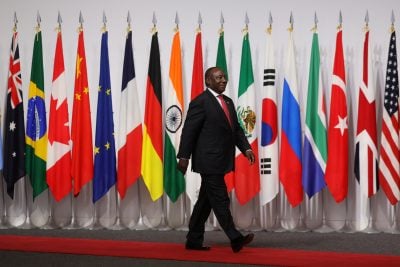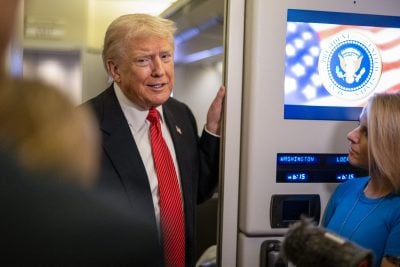Olusegun Aganga, author of Reclaiming the Jewel of Africa: A Blueprint for Taking Nigeria and Africa from Potential to Prosperity, is well-qualified to write a book on how to revive Nigeria’s fortunes: a former Nigerian minister of finance as well as minister of industry, trade and investment, he has also chaired the boards of the World Bank and International Monetary Fund, and chaired the World Trade Organisation’s Ministerial Conference.
An Oxford graduate with extensive private sector experience (his CV boasts senior roles at Goldman Sachs and Ernst & Young), Aganga certainly has the experience required to diagnose his country’s ills. But charting a convincing path forward, as many Nigerian politicians have discovered, is rather trickier in practice.
The book’s narrative covers leadership; political, economic and social institutions; the civil service; the economy; investments; resource management; the Nigerian people; poverty, unemployment and insecurity; multinational organisations; and finally, thoughts on how Nigeria can embark on the “road to reclamation”.
Aganga’s personal story contains cameos from the great and not-so-good of recent Nigerian public life. Aganga was mentored by two powerful Nigerian politicians – former presidents Olusegun Obasanjo and Goodluck Jonathan.
The latter named him finance minster when, as acting president, he formed his first cabinet, shortly before the untimely death of President Umaru Yar’Adua.
Circles of power
Aganga starts by discussing issues surrounding leadership, and how good governance is a vital precondition if Africa is going to take its rightful place in the world.
He writes: “While it is understood that not every African leader can be a Nelson Mandela, with the right mindset every mindful leader can develop the right leadership skillsets and be a role model. Kwame Nkrumah, Seretse Khama and Thomas Sankara are great examples.”
Few would disagree with this assertion. But then again, it might be argued that Aganga’s book is somewhat partial in its analysis of the leadership demonstrated by the Jonathan administration he served.
One of Aganga’s former colleagues in the federal executive was Diezani Alison-Madueke, who held the position of Nigeria’s petroleum minister. In August (after the publication of this book), Alison-Madueke was charged with bribery offences in the UK, having been accused of accepting financial rewards for awarding multi-million dollar oil and gas contracts.
The UK’s National Crime Agency says evidence it provided has also helped the US Department of Justice to recover assets totalling $53.1m, and says its agents have worked closely with Nigeria’s anti-corruption agency, the Economic and Financial Crimes Commission. Alison-Madueke denies wrongdoing.
But despite his disquisition on leadership good and bad, Aganga makes only one reference to Alison-Madueke – a paragraph that describes how on her return to Nigeria from a 20-year spell in Europe, she invited him to spend Christmas with her family.
Stronger on the economy
He is on more reflective ground when outlining the obvious flaws in Nigeria’s economy. His fourth chapter describes how Nigeria is Africa’s biggest economy but remains overly dependent on its exploitation of hydrocarbons.
Aganga says that Nigeria’s overreliance on oil and gas is reflected in three basic statistics: oil accounted for an average of 87.8% of total exports during 2013 to Q1 of 2022; oil revenues averaged 68.86% of total federally collected revenue between 1999 and 2020; and oil and gas production, on average, accounted for about 10% of GDP for most of 2013 to 2020.
Aganga does well in defining Nigeria’s economic problems. But drawing on his experience as minister of finance, he also offers welcome stories of success.
He highlights President Obasanjo’s policy towards the cement industry, which helped to unleash the potential of Nigerian industrial champion Aliko Dangote. Rules introduced by Obasanjo restricted cement import licences to those who showed proof that they would build factories for local cement manufacturing in Nigeria.
Aganga recalls that when he took up the post of minister of finance, he was lobbied aggressively to reverse the legislation. Having resisted the entreaties of the industry’s stakeholders, he says that after four years, Nigeria’s domestic production of cement increased from 11m to 38m tons.
That resulted, Aganga says, in new goals being set to increase exports and reduce the cost of production and distribution and consumer prices, as well as helping to stimulate a national concrete road programme.
Nevertheless, while Dangote has emerged as a continent-spanning champion of Nigerian industry, former President Muhammadu Buhari’s leadership has shown the limits of a protectionist economic policy. His efforts to spur domestic production by introducing import controls have had nowhere near the positive effect of the earlier efforts in cement.
Plans and schemes
Indeed, Aganga concedes that a broader approach needs to be adopted to get the economy on track. He proposes adopting the Lee Kuan Yew approach that proved so successful in Singapore and helped the city state leap from third- to first-world status in little more than a generation. He lauds Lee’s efforts to “keep the size of government small, the economy open and regulation decidedly simple, transparent and effective”. All that would be welcome, but transferring the approach to Nigeria’s Byzantine economy and over 200m-strong population is likely to prove far from simple.
Other recommendations are more straightforward. Investing in institution building, and government support for inclusive economic growth, are “always the solution” and at the bedrock of any win-win strategy, he says.
Another deviation from Buhari’s largely regressive economic policies is Aganga’s willingness to embrace the opportunities of the international trading system, which he knows intimately through his work at the WTO.
Aganga supported inserting the Trade Facilitation Agreement (TFA) into the WTO’s rulebook, an important development in the struggle to create a more equitable global trading framework.
The TFA creates opportunities for developing countries to increase their trading in manufactured goods for export, helping to reduce the export of primary goods that constitute a large share of Africa’s exports. Aganga says it promises to increase the participation of developing countries in global export value chains to produce and export products that meet international standards. It is just one of several instruments – including the emerging African Continental Free Trade Area (AfCFTA) – that Nigeria could use to become a champion of intra-African and global trade and leverage its potentially enormous and multi-faceted economy.
It is through his evident support for the opportunities afforded by an open and trading Nigeria that Aganga may have come up with one of the more effective prescriptions for the ailing patient.
Want to continue reading? Subscribe today.
You've read all your free articles for this month! Subscribe now to enjoy full access to our content.
Digital Monthly
£8.00 / month
Receive full unlimited access to our articles, opinions, podcasts and more.
Digital Yearly
£70.00 / year
Our best value offer - save £26 and gain access to all of our digital content for an entire year!

 Sign in with Google
Sign in with Google 



